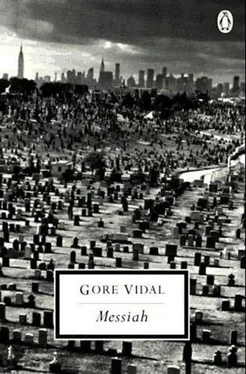Gore Vidal - Messiah
Здесь есть возможность читать онлайн «Gore Vidal - Messiah» весь текст электронной книги совершенно бесплатно (целиком полную версию без сокращений). В некоторых случаях можно слушать аудио, скачать через торрент в формате fb2 и присутствует краткое содержание. Жанр: Современная проза, на английском языке. Описание произведения, (предисловие) а так же отзывы посетителей доступны на портале библиотеки ЛибКат.
- Название:Messiah
- Автор:
- Жанр:
- Год:неизвестен
- ISBN:нет данных
- Рейтинг книги:3 / 5. Голосов: 1
-
Избранное:Добавить в избранное
- Отзывы:
-
Ваша оценка:
- 60
- 1
- 2
- 3
- 4
- 5
Messiah: краткое содержание, описание и аннотация
Предлагаем к чтению аннотацию, описание, краткое содержание или предисловие (зависит от того, что написал сам автор книги «Messiah»). Если вы не нашли необходимую информацию о книге — напишите в комментариях, мы постараемся отыскать её.
Messiah — читать онлайн бесплатно полную книгу (весь текст) целиком
Ниже представлен текст книги, разбитый по страницам. Система сохранения места последней прочитанной страницы, позволяет с удобством читать онлайн бесплатно книгу «Messiah», без необходимости каждый раз заново искать на чём Вы остановились. Поставьте закладку, и сможете в любой момент перейти на страницу, на которой закончили чтение.
Интервал:
Закладка:
"But… well, after what we decided, the initial strategy being… "
"No. It's all changed now, Paul. I'll have to face them, at least this once. I'll talk to them the way I always talk. They'll listen." His voice grew dreamy. He was indifferent to Paul's discomfiture.
"Did you get a new place?" asked Iris, suddenly, to divert the conversation.
"What? Oh yes. A whole house, five stories on East Sixty-first Street. Should be big enough. At least for now." The inter-office communicator sounded. Paul spoke quickly into it: "Tell the newspaper people to wait out there. We'll have a statement in exactly an hour and they'll be able…" he paused and looked at Cave for some reprieve; then, seeing none, he finished: "They'll be able to interview Cave." He flipped the machine off. Through the locked door, we heard a noise of triumph from the gathered journalists and photographers.
"Well, come along," said Clarissa, "I thought this was to be a board of directors meeting. Cave, dear, you've got to preside."
But, though he said he'd rather not, Clarissa, in a sudden storm of legality, insisted that he must: she also maliciously demanded a complete reading of the last meeting's minutes by Paul, the secretary. We were able to save him by a move to waive the reading which was proposed, recorded and passed by a show of hands, only Clarissa dissenting. Cave conducted the meeting solemnly. Then Clarissa demanded a report from the treasurer and this time Paul was not let off.
For the first time I had a clear picture of the company of which I was a director. Shares had been sold. Control was in the hands of Clarissa, while Paul and several West Coast industrialists whose names were not familiar to me, also had shares. The main revenue of the company now came from the sponsor of Cave's television show. There was also a trickle of contributions which, in the last few weeks, had increased considerably.
Then Paul read from a list of expenses, his voice hurrying a little over his own salary which was, I thought, a bit large. Cave's expenses were recorded and, with Clarissa goading from time to time, Paul gave an accounting of all that had been spent since the arrival in New York. John Cave was a big business.
"The books are audited at standard intervals," said Paul, looking at Clarissa as he finished, some of his good humor returning. "We will not declare dividends unless Mrs Lessing insists the company become a profit-making enterprise."
"It might not be a bad idea," said Clarissa evenly. "Why not get a little return…"
But Paul had launched into policy. We listened attentively. From time to time, Cave made a suggestion. Iris and I made no comment. Stokharin occasionally chose to illuminate certain human problems as they arose and Paul, at least, heard him out respectfully. Clarissa wanted to know all about costs and her interruptions were always brief and shrewd.
Several decisions were made at that meeting. It was decided that a Center be established and headed by Dr. Stokharin to take care of those Cavites whose problems might be helped by therapy. "We just apply classical concepts to their little troubles," he said.
"But it shouldn't seem like a clinic," said Iris suddenly. "It's all part of John, of what John says."
"We'll make that perfectly clear," said Paul quickly.
Stokharin nodded agreeably. "After all it is in his name they come to us. We take it from there. No more problems… all is contentment." He smacked his lips.
It was then decided that Cave would spend the summer quietly and, in the autumn, begin a tour of the country to be followed by more telecasts in the following winter. "The summer is to think a little in," were Cave's words.
Next, I was assigned the task of writing a defense of Cave for certain vast syndicates; I was also requested to compose a set of dialogues which would record Cave's views on such problems as marriage, the family, world government and various other problems all in urgent need of answering. I suggested, diffidently, that it would be very useful if Cave were to tell me what he thought about such things before I wrote my dialogues. Cave said, quite seriously, that we would have the summer in which to handle all these subjects.
Paul then told us the bad news; there was a good deal of it. "The Cardinal, in the name of all the Diocesan Bishops, has declared that any Catholic who observes the telecasts of John Cave or attends in person his blasphemous lectures commits a grave and mortal sin. Bishop Winston came to tell me that not only is he attacking Cave in the press but that he is quite sure, if we continue, the government will intervene. It was a hint, and not too subtle."
"On what grounds intervene?" asked Cave. "What have I done that breaks one of their laws?"
"They'll trump up something," said Clarissa. "I'm afraid you're right. They can always find something to get us on. So far, that is about the worst that can happen."
"But do you think it will?" I asked. "Free speech is still on the books."
Paul chuckled grimly. "That's just where it stays, too." And he quoted the national credo: In a true democracy there is no place for a serious difference of opinion on truly great issues. "Sooner or later they'll try to stop Cave."
"But they can't!" said Iris. "The people won't stand for it."
"He's the father of too many now," said Stokharin sagely. "No son will rise to dispute him, yet."
"No use to get excited in advance." Paul was reasonable. "Now let's get a statement ready for the press."
While Paul and Cave worked over the statement, the rest of us chatted quietly about other problems. Stokharin was just about to explain the origin of alcoholism in terms of the new Cavite pragmatism, when Iris said: "Look!" and pointed to the window where, bobbing against the glass, was a bright red child's balloon on which had been crudely painted: "Jesus Saves."
Stokharin chuckled when he saw it. "Very ingenious. Someone gets on the floor beneath and tries to shake us with his miracle. Now we produce the counter-miracle." He slid the window open. The cold air chilled us all. He took his glowing pipe and jabbed it into the balloon which exploded loudly; then he shut the window beaming. "It will be that easy," he said. "I promise you. A little fire and: pop! they disappear like bad dreams."
Seven
1
The next six months after the directors' meeting were full of activity, and danger. Paul was forced to hire bodyguards to protect Cave from disciples as well as from enemies while the rest of us who were now known publicly as Cave's associates were obliged to protect our privacy with unlisted telephone numbers and numerous other precautions none of which did much good for we were continually harassed by maniacs and interviewers.
The effect Cave had made on the world was larger than even Paul, our one optimist, had anticipated. I believe even Cave himself was startled by the vastness and the variety of the response.
As I recall, seldom did a day pass without some new exposé or interpretation of this phenomenon. Bishop Winston attacked after nearly every telecast. The Catholic Church invoked its entire repertory of anathemas and soon it was whispered in devout Christian circles that the anti-Christ had come at last, sent to test the faith. Yet, despite the barrage of attacks, the majority of those who heard Cave became his partisans and Paul, to my regret but to the delight of everyone else, established a number of Cavite Centers in the major cities of the United States, each provided with a trained staff of analysts who had also undergone an intensive indoctrination in Cavesword. Stokharin headed these clinics with great energy. At Cave's suggestion, one evening a week, the same evening, Cavites would gather to discuss Cavesword, to meditate on the beauty of death, led in their discussions and meditations by a disciple of Cave who was, in the opinion of the directors, equal to the task of representing Cave himself and his word before vast congregations.
Читать дальшеИнтервал:
Закладка:
Похожие книги на «Messiah»
Представляем Вашему вниманию похожие книги на «Messiah» списком для выбора. Мы отобрали схожую по названию и смыслу литературу в надежде предоставить читателям больше вариантов отыскать новые, интересные, ещё непрочитанные произведения.
Обсуждение, отзывы о книге «Messiah» и просто собственные мнения читателей. Оставьте ваши комментарии, напишите, что Вы думаете о произведении, его смысле или главных героях. Укажите что конкретно понравилось, а что нет, и почему Вы так считаете.












